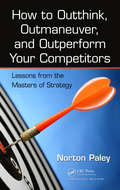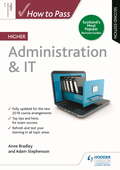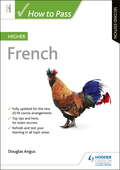- Table View
- List View
How to Organize Yourself
by John CauntHow to Organize Yourself will help you to dramatically improve the way you work. With great tips on how to determine your goals, prioritize your tasks and manage your time, it also includes practical advice on how to: focus on the things that produce results; overcome distractions; build positive work habits; avoid information overload and make effective use of technology. Now in its fifth edition, new content covers the latest software advances that can help you get organized, how to deal with the ubiquitous presence of smartphones and how to adapt to the ever increasing scope for interruption and procrastination in our 24/7 lives. How to Organize Yourself will enable you to take control of your workload, reduce stress and fatigue, and free up time for the things that really matter.The creating success series of books...With over one million copies sold, the hugely popular Creating Success series covers a wide variety of topics and is written by an expert team of internationally best-selling authors and business experts. This indispensable business skills collection is packed with new features, practical content and inspiring guidance for readers across all stages of their careers.
How to Organize Yourself: Simple Ways to Take Control, Save Time and Work More Efficiently (Creating Success #10)
by John CauntDramatically improve the way you work with great tips on how to determine goals, prioritize tasks, overcome distractions; build positive work habits and adjusting to working at home.This fully updated 7th edition now features even more practical exercises, useful templates and top tips to help you get organized, as well as content on how to deal with the ubiquitous presence of smartphones and adapt to the ever increasing scope for interruption and procrastination in our 24/7 lives. How to Organize Yourself will enable you to take control of your workload, reduce stress and fatigue, and free up time for the things that really matter.The Creating Success series of books...Unlock vital skills, power up your performance and get ahead with the bestselling Creating Success series. Written by experts for new and aspiring managers and leaders, this million-selling collection of accessible and empowering guides will get you up to speed in no time. Packed with clever thinking, smart advice and the kind of winning techniques that really get results, you'll make fast progress, quickly reach your goals and create lasting success in your career.
How to Organize Yourself: Simple Ways to Take Control, Save Time and Work More Efficiently (Creating Success)
by John CauntHow to Organize Yourself will help you to dramatically improve the way you work. With great tips on how to determine your goals, prioritize your tasks and manage your time, it also includes practical advice on how to: focus on the things that produce results; overcome distractions; build positive work habits; avoid information overload and make effective use of technology.Updated for 2019, this 6th edition now features even more practical exercises, useful templates, and top tips to help you get organized, as well as content on how to deal with the ubiquitous presence of smartphones and adapt to the ever increasing scope for interruption and procrastination in our 24/7 lives. How to Organize Yourself will enable you to take control of your workload, reduce stress and fatigue, and free up time for the things that really matter.The Creating Success series of books...Unlock vital skills, power up your performance and get ahead with the bestselling Creating Success series. Written by experts for new and aspiring managers and leaders, this million-selling collection of accessible and empowering guides will get you up to speed in no time. Packed with clever thinking, smart advice and the kind of winning techniques that really get results, you'll make fast progress, quickly reach your goals and create lasting success in your career.
How to Outsmart the Credit Bureaus: Everything You Ever Needed to Know About Credit Bureaus
by Credo Company StaffThis book is full of unknown information, that has never been released to the public. It contains detailed information about the credit bureaus and how their database operates. Anyone who has good or bad credit should read this book. This book takes an inside look at the tactics that can be used for individuals seeking to get ahead in life without the use of credit repair or debt consolidation companies. If you ever wanted to know about the secrets of the credit bureaus I stress that you read this book.
How to Outthink, Outmaneuver, and Outperform Your Competitors: Lessons from the Masters of Strategy
by Norton PaleySupplying you with a firm grasp of the roots of strategy, How to Outthink, Outmaneuver, and Outperform Your Competitors: Lessons from the Masters of Strategy explains how to develop the skills and strategies needed to compete in today’s volatile marketplace. It interweaves the classic works of the masters of strategy, such as Sun Tzu, Carl von Clausewitz, Mao Tse-tung, Niccolo Machiavelli, Frederick the Great, Napoleon, and other renowned strategists.The collective insights of these legendary strategists span 2,500 of combative history and have survived meticulous analysis by scholars. Applied to current competitive business conditions, their time-tested rules and guidelines will prepare you to deal with such issues as: preventing competitors from disrupting your overall growth plans, protecting yourself from a rival’s take-over strategies, and strengthening long-term customer relationships.Whether you operate as a multinational firm maneuvering for position in a global arena, or a regional business fighting an everyday battle for survival, the foundational principles provided can reinforce your understanding and practice of strategy. The book defines the historical origins of strategy and supplies timeless insight into how successful leaders have implemented comprehensive strategy plans. It also explains how to: Maneuver out of risky competitive situations and into renewed market opportunities Establish a defensible position in a hotly-contested market Apply competitive business techniques to outperform your rivals Align competitive strategies with your organization’s culture Personalize a leadership style to maximize performance from your staff The book includes three special features: Strategy Diagnostic Tool—A structured system to help you assess your firm’s competitiveness before committing valuable resources. Appraising Internal and External Conditions—A comprehensive checklist to analyze those key factors that can determine the success of your business plan. Strategy Action Plan—A tested format that includes step-by-step guidelines to develop a personalized business plan. The lessons gleaned from military history and strategy can be indispensable in the everyday management of your people and resources. By tapping into the universal logic and historic lessons of strategy, you will fortify your ability to think like a master strategist and add greater precision to your decision-making—thereby allowing you to outthink, outmaneuver, and outperform your competition.
How to Own the Room: Women and the Art of Brilliant Speaking
by Viv GroskopA powerful guide for every woman looking to find—or amplify—her voiceMost books about public speaking don’t tell you what to do when you open your mouth and nothing comes out. And they don’t tell you how to get over the performance anxiety that most people naturally have. They don’t tell you what to do in the moments when you are made, as a woman, to feel small. They don’t tell you how to own the room. This book does.From the way Michelle Obama projects “happy high status,” and the power of J.K.Rowling’s understated speaking style, to Virginia Woolf’s leisurely pacing and Oprah Winfrey’s mastery of inner conviction, what is it that our heroines do to make us sit up and listen - really listen - to their every word? And how can you achieve that impact in your own life? How to Own the Room will show you exactly how.
How to Own the Room: Women and the Art of Brilliant Speaking
by Viv GroskopA powerful guide for every woman looking to find—or amplify—her voiceMost books about public speaking don’t tell you what to do when you open your mouth and nothing comes out. And they don’t tell you how to get over the performance anxiety that most people naturally have. They don’t tell you what to do in the moments when you are made, as a woman, to feel small. They don’t tell you how to own the room. This book does.From the way Michelle Obama projects “happy high status,” and the power of J.K.Rowling’s understated speaking style, to Virginia Woolf’s leisurely pacing and Oprah Winfrey’s mastery of inner conviction, what is it that our heroines do to make us sit up and listen - really listen - to their every word? And how can you achieve that impact in your own life? How to Own the Room will show you exactly how.
How to Own the World: A Plain English Guide to Thinking Globally and Investing Wisely: The new edition of the life-changing personal finance bestseller
by Andrew CraigTHE LIFE-CHANGING PERSONAL FINANCE BESTSELLER THAT SHOWS YOU HOW TO MAKE MONEY FROM YOUR MONEY - NOW IN A REVISED 3RD EDITION.'Opinionated and always packed with information' MirrorDiscover the money secret understood by virtually every rich person in history. Turn hundreds into millions through the power of compound interest. HOW TO OWN THE WORLD shows you that:* No one is better placed than you to make the most of your money. * You can do better than many finance professionals. * Making money from your money is easier than you think.* You can make far more from your money than you ever thought possible. * You can make more from your money than you can from your job. * All this is possible no matter how much you currently earn. * It's easier today than ever. * It's time to start now. It is entirely realistic for you to control your wealth, make a lot of money, and become financially free as a result. HOW TO OWN THE WORLD shows you how. With just a little knowledge you can turn your financial fortunes around and change your life.'For anyone who wants to understand how to best use the tools available in the modern world to learn about becoming a successful investor' Metro'If you want just one book on investment from the cacophony, you couldn't do much better' Michael Mainelli, Economics Professor'Without doubt the best book I have read in the last five years...' Emma Kane, CEO of Newgate Communications
How to Pass Advanced Numeracy Tests
by Mike BryonBy testing expert Mike Bryon, How to Pass Advanced Numeracy Tests provides a wealth of practice questions and detailed explanations to boost your ability in a range of numeracy assessment tests. With over 500 practice questions and four realistic tests, it is ideal for graduate and management level candidates who want to revise the basics and progress to more difficult questions. Sections on quantitative reasoning, data interpretation and business judgement offer realistic practice to help you rise to the challenge and beat the competition.
How to Pass Advanced Verbal Reasoning Tests
by Mike BryonBy testing expert Mike Bryon, How to Pass Advanced Verbal Reasoning Tests provides a huge bank of questions to help you prepare for difficult graduate and managerial recruitment and assessment tests. Offering unbeatable score-improving practice for both online and print tests, it provides 110 warm up questions to get you started and 500+ questions overall. Including four timed realistic tests with interpretations of your score, it contains everything you need to prepare for verbal reasoning tests, stand out from the crowd and bag that job.
How to Pass Graduate Psychometric Tests
by Mike BryonHow to Pass Graduate Psychometric Tests provides a huge bank of questions as well as advice and practice exercises to help you prepare for the rigorous tests used by employers, helping you to build up speed, accuracy and confidence. Covering a range of numerical and verbal skills, it provides 500 practice questions, including 10 realistic full length practice tests; a glossary of essential terms in English usage; a glossary of key mathematical terms and methods; study tips and winning test strategies; answers, explanations and interpretations of your scores. With information on what to expect when attending an assessment centre and detailed advice on how to excel in each activity, How to Pass Graduate Psychometric Tests provides unrivalled support to help you to succeed and win that graduate job.
How to Pass Higher Administration & IT, Second Edition (How To Pass - Higher Level)
by Adam Stephenson Anne BradleyExam Board: SQA Level: Higher Subject: Administration & IT First Teaching: August 2018 First Exam: May 2019Get your best grade with comprehensive course notes and advice from Scotland's top experts, fully updated for the latest changes to SQA Higher assessment. How to Pass Higher Administration & IT Second Edition contains all the advice and support you need to revise successfully for your Higher exam. It combines an overview of the course syllabus with advice from top experts on how to improve exam performance, so you have the best chance of success.- Revise confidently with up-to-date guidance tailored to the latest SQA assessment changes - Refresh your knowledge with comprehensive, tailored subject notes- Prepare for the exam with top tips and hints on revision techniques- Get your best grade with advice on how to gain those vital extra marks
How to Pass Higher Administration & IT: Second Edition Epub
by Adam Stephenson Anne BradleyExam Board: SQA Level: Higher Subject: Administration & IT First Teaching: August 2018 First Exam: May 2019Get your best grade with comprehensive course notes and advice from Scotland's top experts, fully updated for the latest changes to SQA Higher assessment. How to Pass Higher Administration & IT Second Edition contains all the advice and support you need to revise successfully for your Higher exam. It combines an overview of the course syllabus with advice from top experts on how to improve exam performance, so you have the best chance of success.- Revise confidently with up-to-date guidance tailored to the latest SQA assessment changes - Refresh your knowledge with comprehensive, tailored subject notes- Prepare for the exam with top tips and hints on revision techniques- Get your best grade with advice on how to gain those vital extra marks
How to Pass Higher Administration and IT
by Adam Stephenson Anne BradleyGet your best grade with this guide to Higher Administration & IT for CfE.This book contains all the advice and support you need to revise successfully for your CfE Higher exam. It combines an overview of the course syllabus with advice from a top expert on how to improve exam performance, so you have the best chance of success.- Refresh your knowledge with complete course notes- Prepare for the exam with top tips and hints on revision techniques- Get your best grade with advice on how to gain those vital extra marks
How to Pass Higher Art & Design, Second Edition (How To Pass - Higher Level)
by Elaine Boylan Stephanie LightbownExam Board: SQA Level: Higher Subject: Art & Design First Teaching: August 2018 First Exam: May 2019Get your best grade with comprehensive course notes and advice from Scotland's top experts, fully updated for the latest changes to SQA Higher assessment. How to Pass Higher Art & Design Second Edition contains all the advice and support you need to revise successfully for your Higher exam. It combines an overview of the course syllabus with advice from top experts on how to improve exam performance, so you have the best chance of success.- Revise confidently with up-to-date guidance tailored to the latest SQA assessment changes - Refresh your knowledge with comprehensive, tailored subject notes- Prepare for the exam with top tips and hints on revision techniques- Get your best grade with advice on how to gain those vital extra marks
How to Pass Higher Art & Design: Second Edition Epub
by Elaine Boylan Stephanie LightbownExam Board: SQA Level: Higher Subject: Art & Design First Teaching: August 2018 First Exam: May 2019Get your best grade with comprehensive course notes and advice from Scotland's top experts, fully updated for the latest changes to SQA Higher assessment. How to Pass Higher Art & Design Second Edition contains all the advice and support you need to revise successfully for your Higher exam. It combines an overview of the course syllabus with advice from top experts on how to improve exam performance, so you have the best chance of success.- Revise confidently with up-to-date guidance tailored to the latest SQA assessment changes - Refresh your knowledge with comprehensive, tailored subject notes- Prepare for the exam with top tips and hints on revision techniques- Get your best grade with advice on how to gain those vital extra marks
How to Pass Higher Business Management for CfE
by Craig McleodGet your best grade with this guide to Higher Business Management for CfE.This book contains all the advice and support you need to revise successfully for your Higher exam (for CfE). It combines an overview of the course syllabus with advice from a top expert on how to improve exam performance, so you have the best chance of success.- Refresh your knowledge with complete course notes- Prepare for the exam with top tips and hints on revision techniques- Get your best grade with advice on how to gain those vital extra marks
How to Pass Higher Business Management, Second Edition (How To Pass - Higher Level)
by Craig McLeodExam Board: SQA Level: Higher Subject: Business Management First Teaching: August 2018 First Exam: May 2019Get your best grade with comprehensive course notes and advice from Scotland's top experts, fully updated for the latest changes to SQA Higher assessment. How to Pass Higher Business Management Second Edition contains all the advice and support you need to revise successfully for your Higher exam. It combines an overview of the course syllabus with advice from a top expert on how to improve exam performance, so you have the best chance of success.- Revise confidently with up-to-date guidance tailored to the latest SQA assessment changes - Refresh your knowledge with comprehensive, tailored subject notes- Prepare for the exam with top tips and hints on revision techniques- Get your best grade with advice on how to gain those vital extra marks
How to Pass Higher Business Management: Second Edition Epub
by Craig McLeodExam Board: SQA Level: Higher Subject: Business Management First Teaching: August 2018 First Exam: May 2019Get your best grade with comprehensive course notes and advice from Scotland's top experts, fully updated for the latest changes to SQA Higher assessment. How to Pass Higher Business Management Second Edition contains all the advice and support you need to revise successfully for your Higher exam. It combines an overview of the course syllabus with advice from a top expert on how to improve exam performance, so you have the best chance of success.- Revise confidently with up-to-date guidance tailored to the latest SQA assessment changes - Refresh your knowledge with comprehensive, tailored subject notes- Prepare for the exam with top tips and hints on revision techniques- Get your best grade with advice on how to gain those vital extra marks
How to Pass Higher Computing Science, Second Edition (How To Pass - Higher Level)
by Greg ReidExam Board: SQA Level: Higher Subject: Computing Science First Teaching: August 2018 First Exam: May 2019 Get your best grade with comprehensive course notes and advice from Scotland's top experts, fully updated for the latest changes to SQA Higher assessment. How to Pass Higher Computing Science Second Edition contains all the advice and support you need to revise successfully for your Higher exam. It combines an overview of the course syllabus with advice from a top expert on how to improve exam performance, so you have the best chance of success.- Revise confidently with up-to-date guidance tailored to the latest SQA assessment changes - Refresh your knowledge with comprehensive, tailored subject notes- Prepare for the exam with top tips and hints on revision techniques- Get your best grade with advice on how to gain those vital extra marks
How to Pass Higher Computing Science: Second Edition Epub (How To Pass - Higher Level Ser.)
by Greg ReidExam Board: SQA Level: Higher Subject: Computing Science First Teaching: August 2018 First Exam: May 2019 Get your best grade with comprehensive course notes and advice from Scotland's top experts, fully updated for the latest changes to SQA Higher assessment. How to Pass Higher Computing Science Second Edition contains all the advice and support you need to revise successfully for your Higher exam. It combines an overview of the course syllabus with advice from a top expert on how to improve exam performance, so you have the best chance of success.- Revise confidently with up-to-date guidance tailored to the latest SQA assessment changes - Refresh your knowledge with comprehensive, tailored subject notes- Prepare for the exam with top tips and hints on revision techniques- Get your best grade with advice on how to gain those vital extra marks
How to Pass Higher French, Second Edition (How To Pass - Higher Level)
by Douglas AngusExam Board: SQA Level: Higher Subject: French First Teaching: August 2018 First Exam: May 2019Get your best grade with comprehensive course notes and advice from Scotland's top experts, fully updated for the latest changes to SQA Higher assessment. How to Pass Higher French Second Edition contains all the advice and support you need to revise successfully for your Higher exam. It combines an overview of the course syllabus with advice from a top expert on how to improve exam performance, so you have the best chance of success.- Revise confidently with up-to-date guidance tailored to the latest SQA assessment changes - Refresh your knowledge with comprehensive, tailored subject notes- Prepare for the exam with top tips and hints on revision techniques- Get your best grade with advice on how to gain those vital extra marks
How to Pass Higher French: Second Edition Epub
by Douglas AngusExam Board: SQA Level: Higher Subject: French First Teaching: August 2018 First Exam: May 2019Get your best grade with comprehensive course notes and advice from Scotland's top experts, fully updated for the latest changes to SQA Higher assessment. How to Pass Higher French Second Edition contains all the advice and support you need to revise successfully for your Higher exam. It combines an overview of the course syllabus with advice from a top expert on how to improve exam performance, so you have the best chance of success.- Revise confidently with up-to-date guidance tailored to the latest SQA assessment changes - Refresh your knowledge with comprehensive, tailored subject notes- Prepare for the exam with top tips and hints on revision techniques- Get your best grade with advice on how to gain those vital extra marks
How to Pass Higher Geography, Second Edition (How To Pass - Higher Level)
by Bill Dick Sheena WilliamsonExam Board: SQA Level: Higher Subject: Geography First Teaching: August 2018 First Exam: May 2019Get your best grade with comprehensive course notes and advice from Scotland's top experts, fully updated for the latest changes to SQA Higher assessment. How to Pass Higher Geography Second Edition contains all the advice and support you need to revise successfully for your Higher exam. It combines an overview of the course syllabus with advice from top experts on how to improve exam performance, so you have the best chance of success.- Revise confidently with up-to-date guidance tailored to the latest SQA assessment changes - Refresh your knowledge with comprehensive, tailored subject notes- Prepare for the exam with top tips and hints on revision techniques- Get your best grade with advice on how to gain those vital extra marks
How to Pass Higher Geography, Second Edition (How To Pass - Higher Level)
by Bill Dick Sheena WilliamsonExam Board: SQA Level: Higher Subject: Geography First Teaching: August 2018 First Exam: May 2019Get your best grade with comprehensive course notes and advice from Scotland's top experts, fully updated for the latest changes to SQA Higher assessment. How to Pass Higher Geography Second Edition contains all the advice and support you need to revise successfully for your Higher exam. It combines an overview of the course syllabus with advice from top experts on how to improve exam performance, so you have the best chance of success.- Revise confidently with up-to-date guidance tailored to the latest SQA assessment changes - Refresh your knowledge with comprehensive, tailored subject notes- Prepare for the exam with top tips and hints on revision techniques- Get your best grade with advice on how to gain those vital extra marks

















